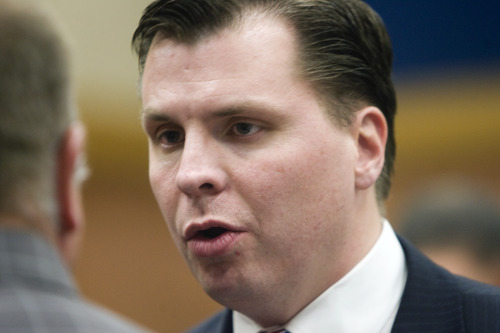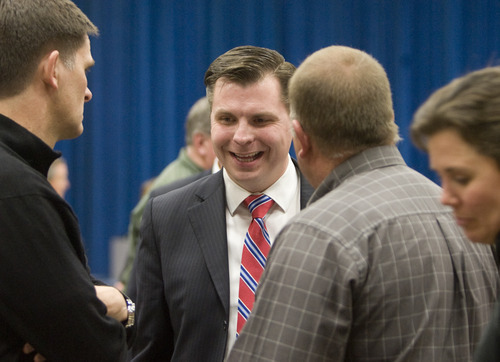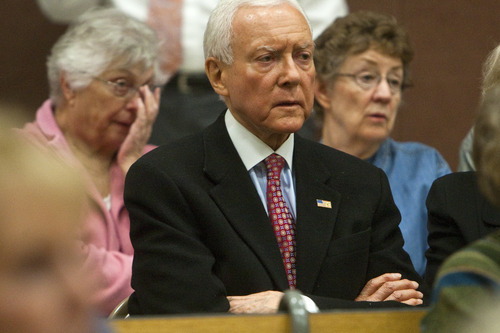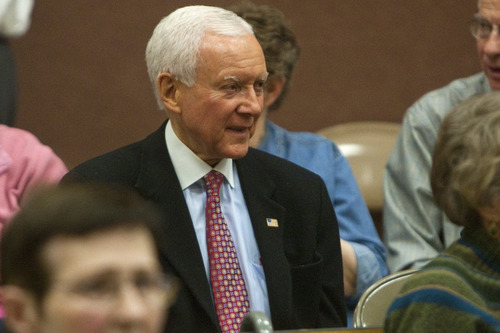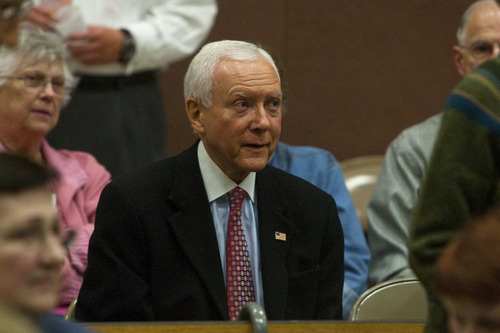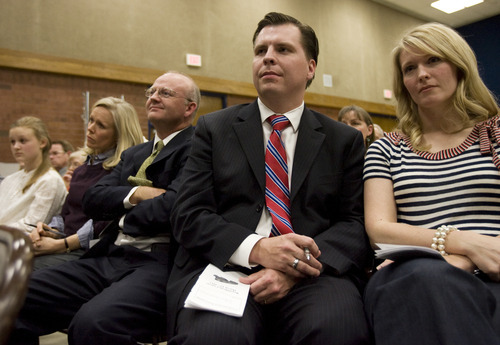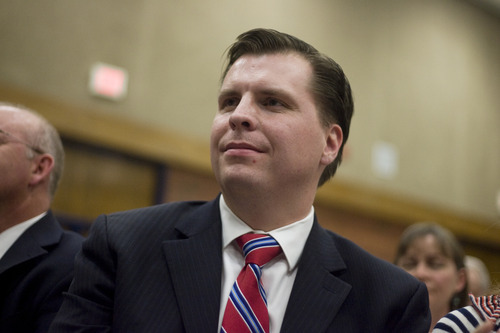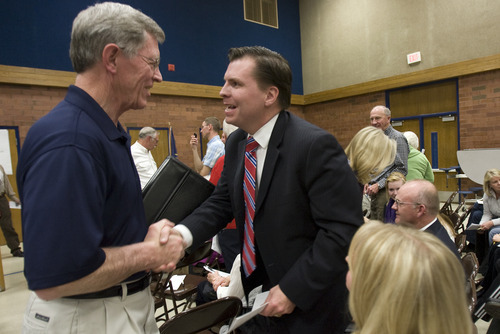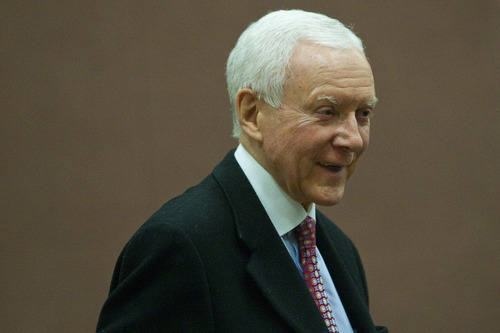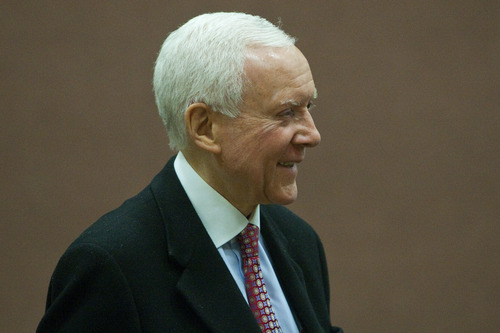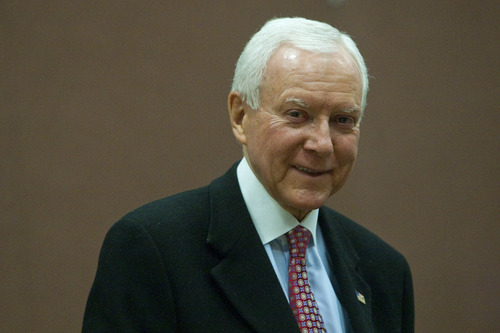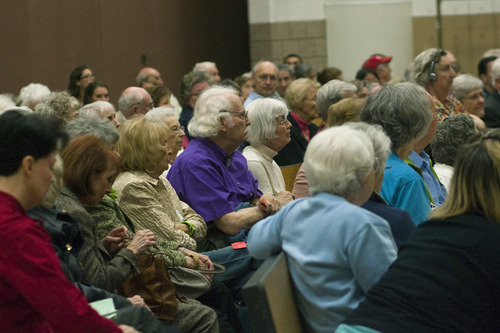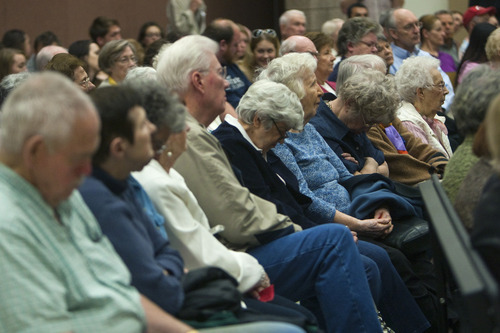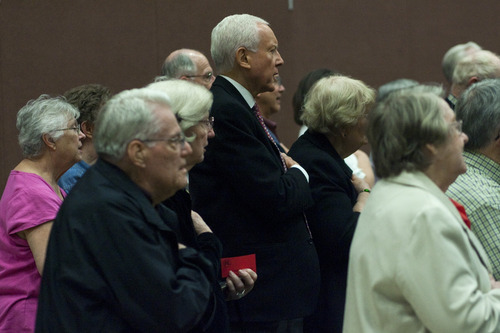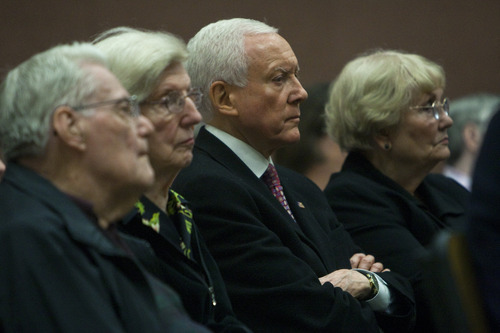This is an archived article that was published on sltrib.com in 2012, and information in the article may be outdated. It is provided only for personal research purposes and may not be reprinted.
About 150 Republicans met in the gymnasium of Washington Elementary Thursday night with the fate of one of them — Sen. Orrin Hatch — in the balance, hinging on the outcome of that gathering and more than 2,000 others like it around the state.
All told, more than 125,000 Republicans flooded into their party caucuses Thursday, more than doubling the record set last year.
After 36 years, Hatch was facing perhaps his gravest political threat, but spent more than a year fighting back, mobilizing supporters to attend the caucuses and by early and anecdotal reports, appears to have fared well.
"I've been told that things went fairly well. Actually I've been told that things went really well, but who knows," Hatch told The Tribune. "I'm a tough old bird and nobody is going to push me around without a fight."
Republican caucus-goers elected 4,000 state delegates, who will gather April 21 to vote on the party's nominee.
Dan Liljenquist, a former state senator and Hatch's leading rival among the 10 GOP challengers, lost the battle in his own Bountiful Precinct 12, with Hatch sweeping all three delegates available there.
Slightly more than half of the crowd supported Hatch — and rules required all delegates to eventually win by a majority through numerous rounds of elimination. Hatch supporters used their slight majority to methodically eliminate pro-Liljenquist candidates, as Liljenquist merely shook his head.
Liljenquist even lost the last available delegate on a 69-68 vote.
One of the winning Hatch delegates, Gordon Hall, said, "We need someone with his background and experience, and not some Johnny-come-lately."
Hall added that he had voted for Liljenquist for the state Senate, but was upset he resigned to campaign for the U.S. Senate. "I don't like someone who quits halfway through a job for self-aggrandizement."
Liljenquist took the home defeat in stride in a precinct where the crowd of 160 was twice as big as two years ago.
"This has always been a Hatch area. One of my neighbors is the finance director for Hatch," he said. "I think it's a generational thing. A lot of older people voted here, but we're hearing reports from places like Utah County, Herriman and South Jordan that we did well with younger crowds."
Hatch also appeared to enjoy strong support in the precinct caucus of challenger and state Rep. Chris Herrod in Provo.
Asked for a show of hands of who supported Hatch, the incumbent had a clear majority of support, while only a smattering were against him.
"It would be senseless to bring Senator Hatch home at this crucial time," said John Payne, who ran unsuccessfully for assistant precinct chairman. "He is fighting for us."
But Jon Wood who came to vote for delegates, said giving Hatch a seventh term meets the definition of insanity — doing the same thing repeatedly and expecting a different result each time.
"I might vote for Senator Hatch, but he has a really big check mark against his name," Wood said, adding that he was still weighing the merits of Liljenquist and Herrod.
Herrod, who sat at the back of a crowded Timpview High School media center, wasn't letting the show of hands discourage him.
"I think [Hatch] was close to half," Herrod said, surveying the crowd. "When you add in the undecided, it comes out to 50-50."
In precincts in Millcreek, Sandy, Ogden, Orem, Draper, Salt Lake City and White City, caucus-goers reported through Twitter and interviews that Hatch loyalists had won all of the delegate spots.
Lucy Smith, who was running for delegate in Hatch's avenues precinct, said she wrote to the senator about an issue and was impressed with his response, but added, "I really don't understand some of the votes he's taken. ... He's got some answering I think to do to all of us, as I think all our senators do."
"He's certainly not the worst thing that could happen to Utah," she concluded. Hatch, who was sitting a few rows back, smiled and chuckled. Smith lost her delegate race.
Max Britton, elected delegate in Salt Lake precinct 21 was willing to overlook his qualms with Hatch and vote for him.
"I respect seniority. I think it's an important asset in Washington, D.C. It's not the way I wish it worked" but it is, said Britton. "I'm a little nervous about having Dan Liljenquist and Mike Lee as our only representation in the Senate. We could get walked all over. ... I don't love every bit of his voting record, but at least when he talks, people listen."
Hatch found a target on his back two years ago, when tea partyers fed-up with Washington flooded caucuses to elect delegates who ousted 18-year incumbent Sen. Bob Bennett — the first time in 70 years a sitting senator in Utah lost his party's nomination.
But the tone at the caucuses Thursday was vastly different than the vitriol that confronted Bennett.
A 2010 Tribune poll of state GOP delegates then found only 19 percent also wanted Hatch elected to another term.
Hatch's campaign spent more than $3.6 million in the past year on ads and efforts to identify and get supporters to the caucus.
FreedomPath, a nonprofit supporting Hatch, spent generously, as well. Hatch's campaign said this week it had identified 5,000 people to run for 4,000 delegate slots, and more than 10,000 more supporters to attend caucuses and help them get elected.
If a candidate wins 60 percent support at the convention, he wins the nomination; if not, the top two vote-winners will be on the ballot in the June primary.
Meanwhile, FreedomWorks, a political action committee opposing Hatch, spent more than $700,000 to find and train potential delegates against Hatch, supplemented by efforts by his GOP foes running mostly to Hatch's political right.
Amid that, other battles for delegates included that Gov. Gary Herbert is also being challenged by five Republicans running to his right, and crowded fields of Republicans seek congressional seat nominations. Several groups also sought to expand caucus participation hoping that greater numbers may help to move the party more to the center and away from its right wing.
The state Republican Party spent $300,000 on ads encouraging greater attendance at caucuses at 2,100 precincts in 600 combined locations. The LDS Church First Presidency even had letters read over the pulpit for three weeks urging its members to attend caucuses.
Some in attendance expressed awe at the turnout.
"I've had this in my home and we've had 10 or 15 people. This is spectacular. It's breathtaking," said J.P. Hughes. "I think there's been a lot more emphasis and energy and encouragement. People are just being energized to do it."
Megan Christensen pointed to the efforts of the Mormon Church for helping boost turnout.
"From the group where I was, I think it was the LDS Church reading that letter," said Christensen. "We used to have two or three people coming. Now we had a contested race."
Democrats elected their state and county delegates Tuesday night, and party officials said attendance was way up — in many cases triple — from years past.
Donald W. Meyers contributed to this report.


